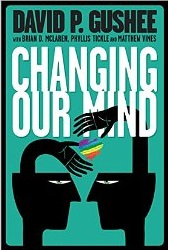By Bob Allen
A Baptist scholar in the news for changing his mind about homosexuality says in the past he wrongly assumed it was only about sex.
 “The whole issue has been misread, fundamentally, only as a sexual ethics issue, and so we’re arguing over who can have sex with who,” David Gushee, Distinguished University Professor of Christian Ethics at Mercer University, said on the Nov. 15 broadcast of State of Belief, a weekly radio podcast with Interfaith Alliance head Welton Gaddy.
“The whole issue has been misread, fundamentally, only as a sexual ethics issue, and so we’re arguing over who can have sex with who,” David Gushee, Distinguished University Professor of Christian Ethics at Mercer University, said on the Nov. 15 broadcast of State of Belief, a weekly radio podcast with Interfaith Alliance head Welton Gaddy.
“The shocking realization for me is that it’s fundamentally a human-dignity issue,” Gushee said. “It’s an image-of-God issue, and — I hate to say it this strongly — but … it’s a spiritual-abuse-of-young-people issue.”
 In the few weeks since Religion News Service columnist Jonathan Merritt wrote a story announcing that Gushee is now pro-LGBT — followed by release of his latest book, Changing Our Mind: A call from America’s leading evangelical ethics scholar for full acceptance of LGBT Christians in the Church — Gushee said he hears daily from young LGBT Christians reaching out to share their stories.
In the few weeks since Religion News Service columnist Jonathan Merritt wrote a story announcing that Gushee is now pro-LGBT — followed by release of his latest book, Changing Our Mind: A call from America’s leading evangelical ethics scholar for full acceptance of LGBT Christians in the Church — Gushee said he hears daily from young LGBT Christians reaching out to share their stories.
Gushee met a number of such people Nov. 8 when he delivered a keynote address and signed books at a Washington training conference for the Reformation Project, a grassroots Christian pro-gay movement led by Matthew Vines, author of God and the Gay Christian.
“I felt like I was in the presence of a transcendent experience of renewed hope after years of harm,” Gushee reflected on the experience. He described worshippers “who felt a deep sense of release and relief, because they were finally hearing that God didn’t hate them and they should never have been mistreated and rejected.”
“We have this deeply wounded population, wounded at the hands of the church, and to see some of those wounds get some balm, some healing, was an experience I will never forget,” Gushee said.
For his part, Gushee said he felt “forgiven.”
“I need to be forgiven for how long this took me and a couple of writings that now I wish I had never said,” he said.
Gushee said he has been “getting contempt and condemnation” since coming out in support of LGBT inclusion, but it mostly seems to be coming from what he calls the “Evangelical Right.” At the same time, he said, he is getting invitations from the broader evangelical world who admit they are struggling with the issue.
“I would say that the hard right fringe on this issue is having a narrower reach, and that’s one reason why they’re so angry, because they know that they’re losing,” Gushee said. “And especially when somebody with the evangelical street cred that I have over 20 years makes this move, it actually ends up marginalizing them.”
“I’ve lost some friends over this, and that has hurt, but I’ve also gained a whole world of new friends, and I’ve had the satisfaction of feeling like I’m following in the footsteps of Jesus,” he continued.
“I really believe this is the kind of thing that Jesus was about, but also my own mentors and teachers — the kind of people I’ve admired and taught about for years. They stood with the unjustly abused and mistreated, and they were borne out by history and they were borne out as having been faithful to the Christian faith.”
Changing Our Mind is Gushee’s 20th book — with previous titles including Kingdom Ethics, a standard textbook in Christian ethics courses — but the first in which he calls for gay, lesbian, bisexual and transgender inclusion in the church.
Much of the book is adapted from 17 essays published between July and October 2014 by Baptist News Global — formerly ABPnews/Herald — where Gushee writes as senior columnist.
Gushee said the reason many of his evangelical colleagues disagree with him on the topic of LGBT inclusion is because of all the verses of Scripture they pick out six or seven passages containing words that seem to refer specifically to homosexual acts.
Gushee said he believes it’s possible to read those same passages in ways that are of “limited relevance” to contemporary devout Christians in committed, monogamous, same-sex relationships. Beyond that, he said, he reads them not in isolation from the larger context of Scripture.
“The traditional way of interpreting the Bible on this issue hurts people, marginalizes people,” Gushee said. “It does exactly the opposite of what Jesus taught us to be about.”
